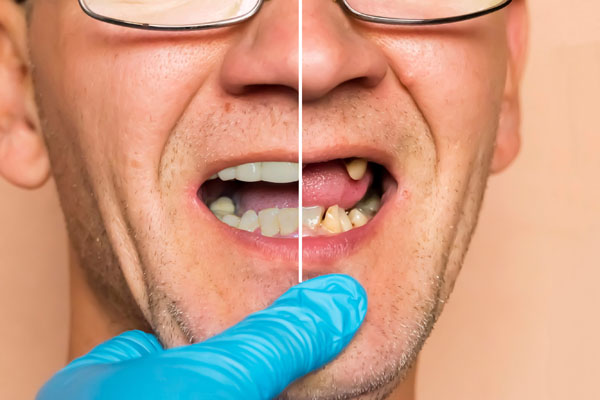 A dentist’s job is to make sure your teeth stay in great health. For many patients, this means considering the benefits of dental restorations. Dentists recommend restorative procedures when a patient has a damaged, diseased, or missing tooth. These standard treatments stop the problem in its tracks, prevent additional injury and infection, and even provide cosmetic benefits.
A dentist’s job is to make sure your teeth stay in great health. For many patients, this means considering the benefits of dental restorations. Dentists recommend restorative procedures when a patient has a damaged, diseased, or missing tooth. These standard treatments stop the problem in its tracks, prevent additional injury and infection, and even provide cosmetic benefits.
What are dental restorations?
Dental restoration involves supplementing existing teeth with synthetic materials. Traditionally, dentists have used metals and composite resin, but ceramic and porcelain parts are increasingly common due to their more natural appearance. Restorative work provides teeth with the necessary repairs, protection, and structural integrity to maintain optimal health.
Common restorative dentistry practices include:
- Fillings
- Crowns
- Bridges
- Dentures
- Implants
- Veneers
When would a dentist recommend dental restorations?
Dentists recommend dental restorations when a tooth or gum concern diminishes your oral health, the functionality of your teeth, or even your self-esteem. The most effective restorative procedure depends on the condition of your teeth and the problem you need to treat.
When you have a cavity
Cavities, or tiny holes, form when a patient fails to maintain good oral hygiene. Because cavities are so common, dentists often find themselves recommending dental fillings to combat them.
When a cavity wears down a tooth, a common way to prevent further damage is to fill the damaged area with synthetic materials. Fillings block harmful bacteria from exacerbating the cavity and restore the tooth’s healthy appearance and functionality. Dentists often recommend fillings as a preventative measure rather than a reactive one.
When you have a cracked, chipped, or missing tooth
If you have an externally-damaged tooth, the impact is more than just aesthetic. Even slight changes to a tooth’s structure degrade its integrity, putting the tooth at risk for injury or infection.
Crowns provide an ideal solution for restoring cracked, chipped, or missing teeth to their original condition. Built to resemble the shape and consistency of natural teeth, a crown sits on top of a damaged tooth to give the illusion that the tooth is still intact. Bridges, which consist of multiple crowns strung together, are ideal for filling the gap caused by a missing tooth, as open wounds invite bacteria and infection.
When you struggle with confidence
Sometimes, a dentist’s reason for recommending restorative dentistry has less to do with the patient’s physical health. If a patient has noticeable gum or teeth concerns that detract from their self-esteem, a dentist might recommend restorative work.
Although restorations are not intended to be cosmetic fixes, most dental repairs do improve a patient’s smile and confidence. Since ceramic and porcelain materials contribute to a more realistic appearance, dentists may suggest veneers to patients wanting a professional, polished touch.
Conclusion
Dentists recommend dental restorations when a patient presents with damaged, diseased, or missing teeth. Without protection, impaired teeth continue to deteriorate and can eventually lead to dental decay, tooth death, or systematic infection. These restorative practices primarily aim to improve a patient’s oral health, but patients looking for cosmetic enhancements benefit from the resulting fuller, healthier smile.
Request an appointment or call R. David Brumbaugh, DDS at 214-306-4402 for an appointment in our Dallas office.
Related Posts
People who are looking to improve their smiles often consider the various dental restorations that are available. These restorations can fix a number of issues, including missing, fractured, chipped, decayed, and weakened teeth. The purpose of the procedures is to improve not only the look of the teeth but also their function. Depending on the…
For patients who have damaged or decaying teeth, dental restorations may be a necessity. Dentists use a variety of restorative procedures to protect and repair the structural integrity of an individual's teeth. Some of the most common restoration procedures may include dentures, crowns, and fillings.No individual should suffer from severe tooth pain or discomfort. Decaying…
Dental restorations have been used for thousands of years. In fact, a 2012 article published by The New York Times details the discovery of a 6,500-year-old human jawbone. Considered the earliest evidence of dental fillings, it had beeswax in one tooth, which researchers believe was to ease the pain of a crack. These days, restorations…


